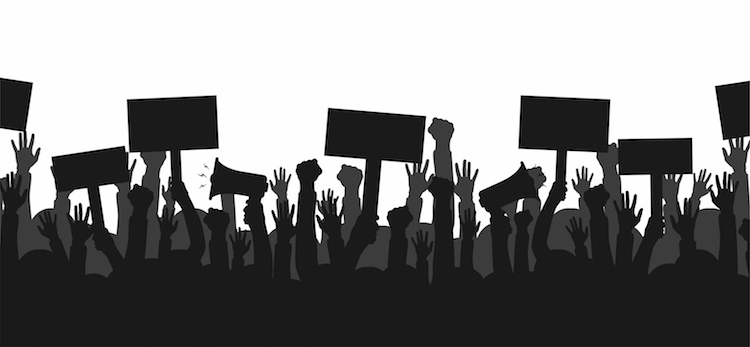Judges should know risks before attending public protests, ethics committee says

Image from Shutterstock.com.
A California Supreme Court advisory committee has warned the state’s judges about the ethical risks of attending public protests.
In its July 20 opinion, the court’s Committee on Judicial Ethics Opinions said although judges might feel morally obligated to support racial justice and equality by participating in demonstrations and rallies in their communities, they have a duty to promote the public’s confidence in an impartial justice system.
A July 22 press release is here. Law.com and Law360 have coverage.
“The opinion has a lot of value to bench officers, and we wrote it in a way that can grow legs,” committee member and Santa Clara County Superior Court Judge Erica Yew told Law.com on Wednesday. “It’s not just an opinion for the moment.”
The committee acknowledged that recent events ignited a national conversation about racial justice, and as the California Supreme Court said last month in its statement on equality and inclusion, judicial officers are responsible for confronting “the injustices that have led millions to call for a justice system that works fairly for everyone.”
However, the committee added, while public demonstrations and rallies are “not necessarily partisan,” they address matters at the center of current debate and litigation and may relate to “subjects over which passions run high.”
“Given the intense societal focus on public events that address these issues, a judge’s participation in them is likely to be the subject of public scrutiny,” the committee said. “For these reasons, judges must accept certain restrictions that might be viewed as burdensome by other members of the community.”
According to the opinion, restrictions include:
- Judges should avoid protests that relate to matters pending before the court or that are likely to come before the court.
- Judges should not attend a demonstration or rally if they are likely to violate a curfew or other law.
- Judges should not appear to speak on behalf of or lend the prestige of their office to a political candidate or organization.
- Judges should be vigilant and prepared to leave if staying at a protest might violate their ethical duties or interfere with their judicial obligations.
- Judges should avoid engaging in symbolic acts, carrying signs or wearing clothing or buttons that could undermine the public’s confidence in an impartial judiciary.
Judges who wish to share their views on recent events should consider writing a letter or providing a statement to the media instead of participating in public protests, the committee recommends.
“By doing so, judges may make their views on a subject known while avoiding many of the risks inherent in participating in a public demonstration or rally and can maintain control over the tone and substance of the message they wish to convey,” the committee said.
Law.com reports that after the California Supreme Court released its statement, California Chief Justice Tani G. Cantil-Sakauye said publicly that she was “deeply disturbed” by the “action and inaction” that led to the death of George Floyd while he was in Minneapolis police custody May 25.
The Washington Supreme Court has also released a statement urging the legal community to confront racial injustice.



